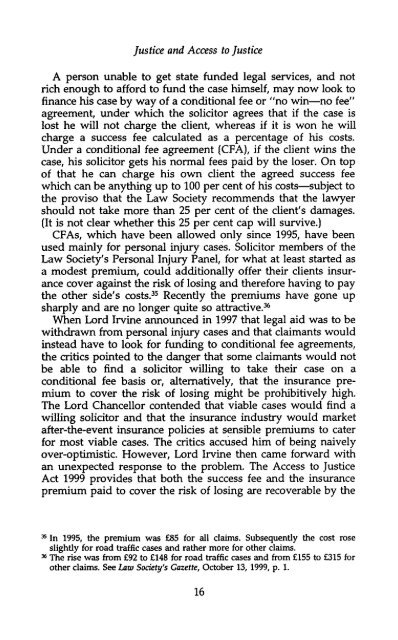HAMLYN - College of Social Sciences and International Studies ...
HAMLYN - College of Social Sciences and International Studies ...
HAMLYN - College of Social Sciences and International Studies ...
Create successful ePaper yourself
Turn your PDF publications into a flip-book with our unique Google optimized e-Paper software.
Justice <strong>and</strong> Access to Justice<br />
A person unable to get state funded legal services, <strong>and</strong> not<br />
rich enough to afford to fund the case himself, may now look to<br />
finance his case by way <strong>of</strong> a conditional fee or "no win—no fee"<br />
agreement, under which the solicitor agrees that if the case is<br />
lost he will not charge the client, whereas if it is won he will<br />
charge a success fee calculated as a percentage <strong>of</strong> his costs.<br />
Under a conditional fee agreement (CFA), if the client wins the<br />
case, his solicitor gets his normal fees paid by the loser. On top<br />
<strong>of</strong> that he can charge his own client the agreed success fee<br />
which can be anything up to 100 per cent <strong>of</strong> his costs—subject to<br />
the proviso that the Law Society recommends that the lawyer<br />
should not take more than 25 per cent <strong>of</strong> the client's damages.<br />
(It is not clear whether this 25 per cent cap will survive.)<br />
CFAs, which have been allowed only since 1995, have been<br />
used mainly for personal injury cases. Solicitor members <strong>of</strong> the<br />
Law Society's Personal Injury Panel, for what at least started as<br />
a modest premium, could additionally <strong>of</strong>fer their clients insurance<br />
cover against the risk <strong>of</strong> losing <strong>and</strong> therefore having to pay<br />
the other side's costs. 35 Recently the premiums have gone up<br />
sharply <strong>and</strong> are no longer quite so attractive. 36<br />
When Lord Irvine announced in 1997 that legal aid was to be<br />
withdrawn from personal injury cases <strong>and</strong> that claimants would<br />
instead have to look for funding to conditional fee agreements,<br />
the critics pointed to the danger that some claimants would not<br />
be able to find a solicitor willing to take their case on a<br />
conditional fee basis or, alternatively, that the insurance premium<br />
to cover the risk <strong>of</strong> losing might be prohibitively high.<br />
The Lord Chancellor contended that viable cases would find a<br />
willing solicitor <strong>and</strong> that the insurance industry would market<br />
after-the-event insurance policies at sensible premiums to cater<br />
for most viable cases. The critics accused him <strong>of</strong> being naively<br />
over-optimistic. However, Lord Irvine then came forward with<br />
an unexpected response to the problem. The Access to Justice<br />
Act 1999 provides that both the success fee <strong>and</strong> the insurance<br />
premium paid to cover the risk <strong>of</strong> losing are recoverable by the<br />
35 In 1995, the premium was £85 for all claims. Subsequently the cost rose<br />
slightly for road traffic cases <strong>and</strong> rather more for other claims.<br />
36 The rise was from £92 to £148 for road traffic cases <strong>and</strong> from £155 to £315 for<br />
other claims. See Law Society's Gazette, October 13, 1999, p. 1.<br />
16

















